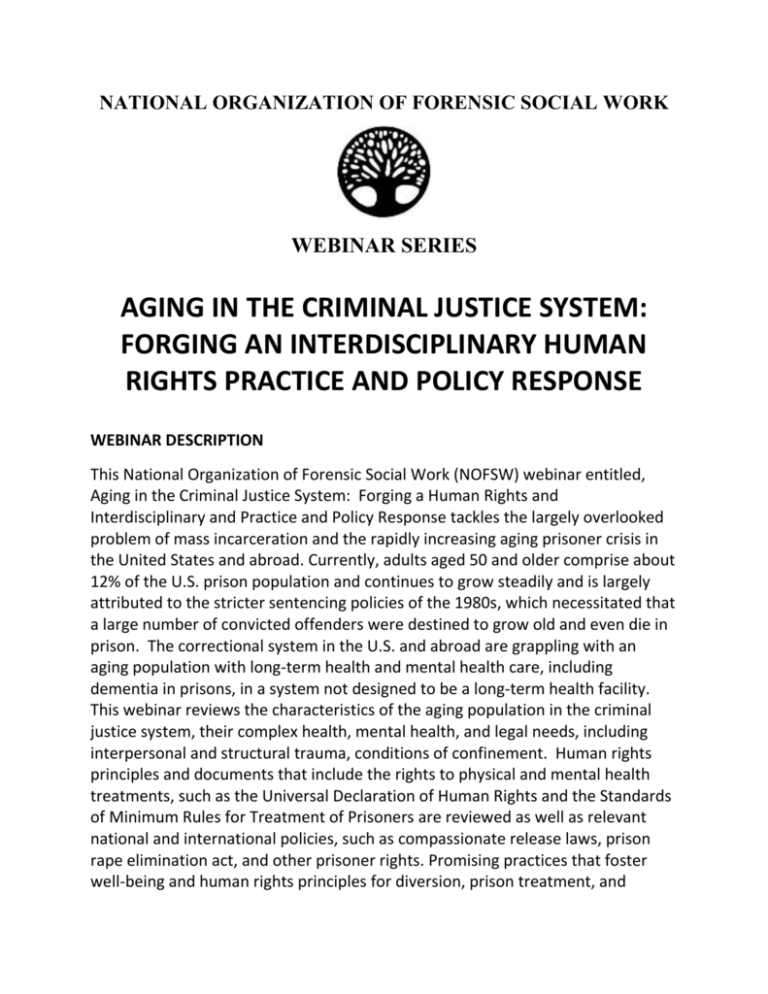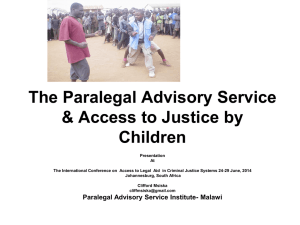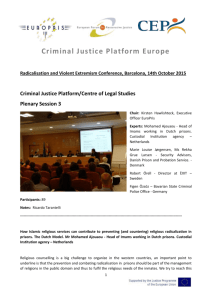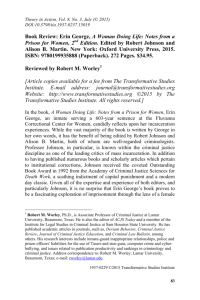Webinar-Announcement-Final-Aging-in-the-Criminal-Justice
advertisement

NATIONAL ORGANIZATION OF FORENSIC SOCIAL WORK WEBINAR SERIES AGING IN THE CRIMINAL JUSTICE SYSTEM: FORGING AN INTERDISCIPLINARY HUMAN RIGHTS PRACTICE AND POLICY RESPONSE WEBINAR DESCRIPTION This National Organization of Forensic Social Work (NOFSW) webinar entitled, Aging in the Criminal Justice System: Forging a Human Rights and Interdisciplinary and Practice and Policy Response tackles the largely overlooked problem of mass incarceration and the rapidly increasing aging prisoner crisis in the United States and abroad. Currently, adults aged 50 and older comprise about 12% of the U.S. prison population and continues to grow steadily and is largely attributed to the stricter sentencing policies of the 1980s, which necessitated that a large number of convicted offenders were destined to grow old and even die in prison. The correctional system in the U.S. and abroad are grappling with an aging population with long-term health and mental health care, including dementia in prisons, in a system not designed to be a long-term health facility. This webinar reviews the characteristics of the aging population in the criminal justice system, their complex health, mental health, and legal needs, including interpersonal and structural trauma, conditions of confinement. Human rights principles and documents that include the rights to physical and mental health treatments, such as the Universal Declaration of Human Rights and the Standards of Minimum Rules for Treatment of Prisoners are reviewed as well as relevant national and international policies, such as compassionate release laws, prison rape elimination act, and other prisoner rights. Promising practices that foster well-being and human rights principles for diversion, prison treatment, and community reentry programs, including dementia and hospice care, are reviewed. The overall objective is to: (1) increase participants understanding of aging in the criminal justice system and to (2) provide participants with interdisciplinary knowledge, values, and practical to work collaboratively with interdisciplinary professionals and other key stakeholders to take action on a local and global level to foster social change and policy reform that human and economic costs of older adults in the criminal justice system. Presenters: Tina Maschi, PhD, LCSW, ACSW; Associate Professor, Fordham University, President of National Organization of Forensic Social Work; Executive Director of the Be the Evidence Project. J. Soffiyah Elijah, JD joined the Correctional Association of New York as the Executive Director in March 2011. The Correctional Association is an independent not for profit organization tasked with monitoring prison conditions throughout New York State. Jean Ross, JD is an attorney who has had the honor and privilege of working with and on behalf of people confined in the toxic environments of the two institutions in our society which have the legal authority to confine people involuntarily: prisons and psychiatric hospitals. Bonnie Kerness, MSW has been an anti-racist activist since she was 14, working at the University Settlement House as a volunteer on issues of housing, neighborhood and gangs. Bonnie gained her Masters in Social Work and has served as a human rights advocate on behalf of prisoners since 1975, working as coordinator of the American Friends Service Committee’s re-entry services project for over 15 years. Date: Monday, September 24, 2012 Time: 12:30 pm-2:15 pm, Eastern Time Webinar Link: https://www3.gotomeeting.com/register/640612022 CEU Credits: 1.5 NOFSW Contact Information: For more information about NOFSW and the 29th annual conference, please visit our web site at www.nofsw.org or contact our Executive Director, Paul Brady pbrady@nofsw.org or Tina Maschi at tmaschi@fordham.edu Presenter Biographical Sketches Dr. Tina Maschi is an assistant professor at the Fordham University Graduate School of Social Service in New York City and President-Elect of the National Organization of Forensic Social Workers. Her research is at the intersection of aging, mental health, and the criminal justice system. She is a 2010 recipient of the competitive Hartford Geriatric Social Work Faculty Scholars Program Award, which is funded by the Hartford Foundation and the Gerontological Society of America (GSA). She is the principal investigator for the research project, "Trauma, coping resources, and well-being among older adults in prison." The recent publications based on this study have broken new ground in aging prisoner research. In general, she has published in the area of older adults involved in the criminal justice system, particularly related to life course trauma and stress among older adults. Additionally, she also has received intramural research grants and fellowships for her research and conducting a mixed methods research study on aging prisoners, including community reintegration. Dr. Maschi also has published extensively on trauma among criminal justice populations and older adults in prison in social work and interdisciplinary journals. Dr. Maschi is the lead editor of the book, Forensic Social Work: Psychosocial and Legal Aspects in Diverse Practice Settings and the lead author of the soon to be released book, Social Worker as Researcher: Integrating Social Work Research with Advocacy that infuses aging content throughout the course. Recent publications include: Trauma and Stress among Older Adults in the Criminal Justice System and Trauma, Stressful Life Event and Post Traumatic Stress Symptoms: Do Subjective Impressions Matter? She is the founder and executive director of the Be the Evidence Project which has the purpose of advancing human rights and social justice through public awareness projects, such as the aging prisoner crisis. On October 8, 2011, the Project hosted the community forum: Aging Prisoners: A Crisis in Need of Intervention and published the White Paper available at: http://sites.google.com/site/betheevidenceproject/whitepaper-aging-prisoner-forum Dr. Maschi also is a 2009 recipient of the Council on Social Work Education’s Faculty Scholar’s Award for the research project for Promising Practices in Social Work Research Education. She also is the project director for the Bachelor’s Experiential Learning Project, Moving Stories: Older Adults Talk about Their Experiences Before, During, and After Immigration which was funded by the John A. Hartford Foundation through the Council on Social Work Education’s Gero-Ed Center. The experiential learning project enabled social work students to partner with community dwelling older adults, who volunteered to share their personal or family immigration experiences and/or other aspects of their life history. Dr. Maschi also has over 15 years of clinical social work and research experience in juvenile and criminal justice settings and community mental health settings. She also is a professional musician and integrates the use of creative arts intervention on increasing well-being among diverse populations. Read more about Dr. Maschi’s work at: www.fordham.edu/btep CONTACT INFORMATION: Tina Maschi, PhD, LCSW, ACSW President-National Organization of Forensic Social Work Executive Director-Be the Evidence Project Associate Professor, Fordham University Graduate School of Social Service 113 West 60th Street New York, NY 10023/ Tel: (914) 367-3105 or (201) 218-5064/Fax: (914) 367-3112 Email: tmaschi@fordham.edu / Website: www.fordham.edu/btep J. Soffiyah Elijah J. Soffiyah Elijah joined the Correctional Association of New York as the Executive Director in March 2011. She is the first person of color to head the 168 year old organization. The Correctional Association is an independent not for profit organization tasked with monitoring prison conditions throughout New York State. Prior to joining the CA, Ms. Elijah served as Deputy Director of the Criminal Justice Institute (CJI) at Harvard Law School (HLS). In her capacity as Deputy Director at CJI, she was responsible for leading the fulfillment, development and expansion of the Institute’s work to address the urgent needs of the powerless, voiceless and indigent in the criminal justice system. Ms. Elijah was a clinical instructor at CJI prior to being selected to serve as deputy director. As a clinician, she supervised third-year law students in the representation of adult and juvenile clients. Prior to coming to Harvard Law School, Ms. Elijah was a member of the faculty at the City University of New York (CUNY) School of Law. She served as Director and Supervising Attorney of the Defender Clinic. At the Child Welfare Advocacy Fellowship Program, where she also served as Director and Supervising Attorney, Ms. Elijah directed the development of law students to work as creative advocates in New York City’s child welfare system. In addition, Professor Elijah taught courses in criminal procedure and juvenile rights. Ms. Elijah practiced law through various avenues before transitioning into the clinical practice of academia. She was a Supervising Attorney at the Neighborhood Defender Service of Harlem (NDS), where she defended indigent members of the Harlem, New York community. Before joining NDS, Ms. Elijah was in private practice, specializing in criminal defense and family law. She also worked as a Staff Attorney for the Juvenile Rights Division of the Legal Aid Society. With more than 25 years in the legal profession, the scope of her interests and scholarship is diverse. Prof. Elijah has authored several articles and publications based on her research of the U.S. criminal justice and prison systems. Born in Queens, New York, Ms. Elijah earned a Bachelor of Arts from Cornell University and a Juris Doctorate from Wayne State University Law School (Detroit, Michigan). Correctional Association of New York 2090 Adam Clayton Powell, Jr. Blvd. Suite 200 New York, NY 10027-4990 Tel. (212) 254-5700 Fax. (212) 473-2807 www.correctionalassociation.org Jean Ross Jean Ross is an attorney who has had the honor and privilege of working with and on behalf of people confined in the toxic environments of the two institutions in our society which have the legal authority to confine people involuntarily prisons and psychiatric hospitals. She believes: 1. that struggles for structural change should include empowerment of persons in confinement, their families and their communities, as well as direct intervention to mitigate individual harm; 2. that direct experiences is necessary to inform systemic advocacy, but such broader advocacy is necessary to achieve meaningful individual relief; 3. that the people who live and work in toxic institutions have some common cause; 4. that the present generation is not expendable and cannot wait for comprehensive social and political change. Therefore, she works on administrative and legislative levels, and in the courts, as well as with individuals, families and community organizations. She is committed to a collaborative and holistic model of law practice and to illuminating the contradictions, in our struggling democracy, to humanistic and democratic ideals. Contact Information: JeanRoss55@aol.com Bonnie Kerness, MSW Bonnie Kerness has been an anti-racist activist since she was 14, working at the University Settlement House as a volunteer on issues of housing, neighborhood and gangs. In 1961, at the age of 19, she moved to Tennessee to participate in the Civil Rights Movement. In Memphis she was trained as a community organizer by the NAACP. She continued her work and training at Highlander Training School in Knoxville, where organizers from throughout the Civil Rights movement met for training and brainstorming. Bonnie moved back North in 1970 and became active with welfare rights, tenants rights and anti-war issues. Bonnie gained her Masters in Social Work and has served as a human rights advocate on behalf of prisoners since 1975, working as coordinator of the American Friends Service Committee’s re-entry services project for over 15 years. Since currently serves as coordinator of AFSC’s Prison Watch Project. Bonnie has raised eight children, three Caucasian and five of African decent. She has served as Associate Director and Acting Director of the AFSC Criminal Justice Program in Newark, the National Coordinator of the Campaign to Stop Control Unit Prisons and formerly served on the Board of Directors of the World Organization For Human Rights, USA. She currently serves on the Advisory Board of California Prison Focus; Women Who Never Give Up, and Solitary Watch, a blog on the use of isolationand torture in US prisons.. She has helped publish, “Our Children’s House”; the pamphlet and from that has written a play wiby the same name with the late Bill Witherop. She has also helped publish “Torture in US Prisons – Evidence of US Human Rights Violations; “The Prison Inside the Prison: Control Units, Supermax Prisons and Devices of Torture”, the Survivor’s Manual and “Inalienable Rights: An AFSC Resource Guide.” Bonnie speaks widely on behalf of men, women and children in prison about US human rights violations of the UN Convention Against Torture largely about the use isolation and the use of devices of torture in US prisons. She has written and been quoted in articles, books and other publications on prison related subjects. Contact Information: kerness.b@verizon.net









